I like Chaka Khan.
I did not know she was doing a Joni Mitchell tribute album.
It's apparently close to finished.
The two tracks I heard were raw and I hope they stay that way.
Chaka really brings Joni to life.
If this is what the album's going to be -- basically guitar and musical accents backing her powerhouse vocals -- this could end up being 2016's finest album.
Closing with C.I.'s "Iraq snapshot:"
Wednesday, February 10, 2016. Chaos and violence continue, Hillary
Clinton continues to embrace destruction and death, Brett McGurk spins
to Congress, and much more.
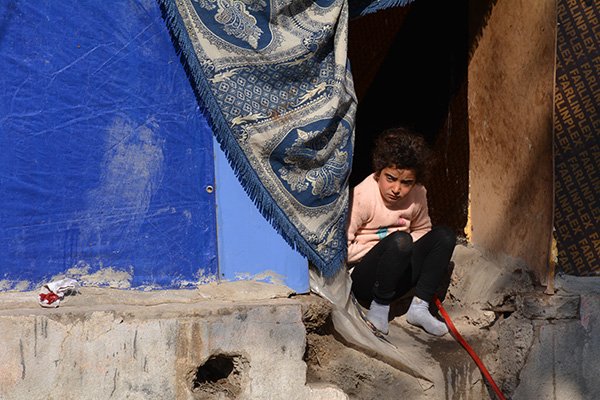
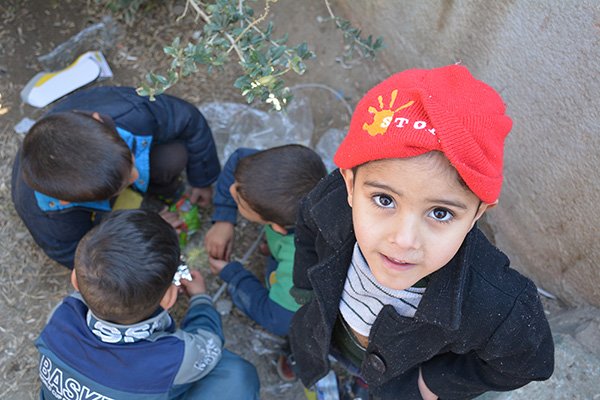
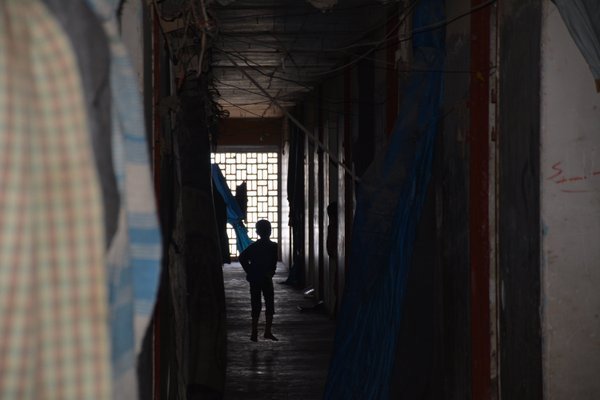
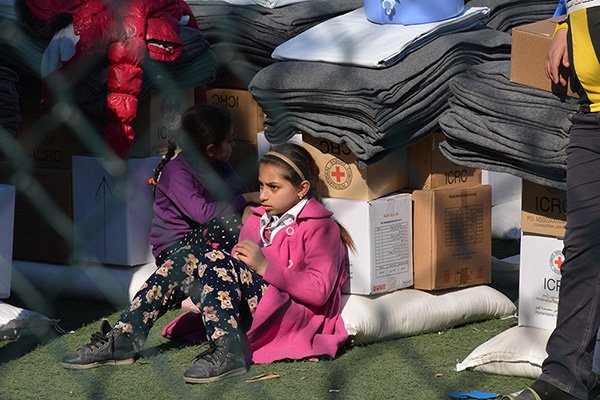
A mistake, she insists, she made but she's not doing anything to help the children in Iraq with birth defects.
That's from Al Jazeera.
This is from Justice for the Babies of Fallujah:
In 2014, Dahr Jamail (TRUTH OUT) reported on the increase in birth defects and how "Iraqi doctors and prominent scientists" argue this is the result of the US using Depleted Uranium:
It is estimated that the United States used 350 tons of DU munitions in Iraq during the 1991 war, and 1,200 tons during its 2003 invasion and subsequent occupation.
Official Iraqi government statistics show that, prior to the outbreak of the first Gulf War in 1991, the country's rate of cancer cases was 40 out of 100,000 people. By 1995, it had increased to 800 out of 100,000 people, and, by 2005, it had doubled to at least 1,600 out of 100,000 people. Current estimates show the trend continuing.
The actual rate of cancer and other diseases is likely to be much higher than even these figures suggest, due to a lack of adequate documentation, research and reporting of cases.
Frederick Reese (MINT NEWS PRESS) also reported on the tragedy:
According to Iraqi government statistics, the rate of cancer in the country has skyrocketed from 40 per 100,000 people prior to the First Gulf War in 1991, to 800 per 100,000 in 1995, to at least 1,600 per 100,000 in 2005.
The culprit behind all of these health issues is depleted uranium, a byproduct of uranium enrichment. With a mass fraction a third of what fissile uranium would have, depleted uranium emits less alpha radiation — up to 60 percent less than natural uranium, according to the U.S. Department of Defense. This “relative” safety offered a rationale for many nations — particularly, the U.S. — to put the waste material to use.
Hillary insists she made a mistake and should be forgiven for that mistake.
But she's made no effort to make good on her mistake.
She insists she's fueled in her motivation by being a grandmother but she has no concern for the children of Iraq.
Her "mistake" cost lives.
She's given lip service to the issue of Iraq, she's made no real effort to make amends for her vote.
Meanwhile, US President Barack Obama continues bombing Iraq to bring about 'peace.' Today, the US Defense Dept announced/claimed/bragged:
Strikes in Iraq
Attack, fighter and remotely piloted aircraft and rocket artillery conducted 18 strikes in Iraq, coordinated with and in support of Iraq’s government:
-- Near Baghdadi, a strike destroyed an ISIL supply cache.
-- Near Huwayjah, two strikes struck an ISIL tactical unit and destroyed an ISIL vehicle bomb and two ISIL vehicles.
-- Near Habbaniyah, a strike struck a large ISIL tactical unit.
-- Near Haditha, a strike destroyed an ISIL vehicle.
-- Near Kirkuk, a strike destroyed an ISIL vehicle.
-- Near Mosul, five strikes struck three separate ISIL tactical units and destroyed 15 ISIL fighting positions, an ISIL vehicle and an ISIL checkpoint.
-- Near Ramadi, four strikes struck an ISIL tactical unit and destroyed two ISIL fighting positions, an ISIL heavy machine gun position, an ISIL vehicle bomb facility and cratered an ISIL-used road.
-- Near Sinjar, three strikes destroyed three ISIL fighting positions and suppressed two separate ISIL mortar positions.
Task force officials define a strike as one or more kinetic events that occur in roughly the same geographic location to produce a single, sometimes cumulative, effect. Therefore, officials explained, a single aircraft delivering a single weapon against a lone ISIL vehicle is one strike, but so is multiple aircraft delivering dozens of weapons against buildings, vehicles and weapon systems in a compound, for example, having the cumulative effect of making those targets harder or impossible for ISIL to use. Accordingly, officials said, they do not report the number or type of aircraft employed in a strike, the number of munitions dropped in each strike, or the number of individual munition impact points against a target.
Barack's been bombing Iraq from the air since August of 2014.
Starting with US politics, yesterday
Hillary Clinton suffered a stunning loss in New Hampshire as voters in
that state's Democratic Party primary overwhelmingly chose Senator
Bernie Sanders while rejecting her to be the party's presidential
nominee.
Among her problems with voters? Her 2002 vote for the Iraq War.
While Hillary eventually would term the vote a "mistake," that only created more problems for her.
When most people were taught by parents and/or guardians about mistakes,
they were taught not only to admit to their mistake but to make some
good faith effort to fix the mistake.
Hillary keeps insisting she has some fabled foreign policy knowledge.
But if her vote for the war on Iraq was a mistake -- and if she's so smart -- where is the effort to make good on her mistake?
Abandoned buildings, schools & makeshift camps, these are the places thousands of kids call home in #Iraq today.




She's done nothing to help or advocate for the children pictured above.
She has, however, used her own status -- recent status -- as a
grandmother to campaign on. It bit her in the ass when she was
insisting she's just like an "abuela." She's also repeated used her status as a grandmother to insist she'd be a better leader.
Adam Carlson (PEOPLE) quoted Hillary stating, "It will affect my being, not just my thinking. [. . .] Having that next generation right
there and thinking about everything you want to do both personally but
in our cases, publicly and professionally, to give that child the best
chance in life to be all he or she can be, that is profoundly moving to
me."
Is it profoundly moving to her?
It's a tiny and limited sort of 'profound,' one that doesn't go beyond her own family.
A mistake, she insists, she made but she's not doing anything to help the children in Iraq with birth defects.
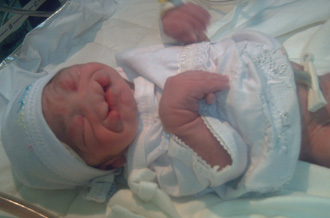 |
| "Findings suggest the enriched Uranium exposure is either a primary cause or related to the cause of the congenital anomaly and cancer increases," says a recent scientific report on the incidence of birth defects in Fallujah [Dr Samira Alani] |
That's from Al Jazeera.
This is from Justice for the Babies of Fallujah:
In 2014, Dahr Jamail (TRUTH OUT) reported on the increase in birth defects and how "Iraqi doctors and prominent scientists" argue this is the result of the US using Depleted Uranium:
It is estimated that the United States used 350 tons of DU munitions in Iraq during the 1991 war, and 1,200 tons during its 2003 invasion and subsequent occupation.
Official Iraqi government statistics show that, prior to the outbreak of the first Gulf War in 1991, the country's rate of cancer cases was 40 out of 100,000 people. By 1995, it had increased to 800 out of 100,000 people, and, by 2005, it had doubled to at least 1,600 out of 100,000 people. Current estimates show the trend continuing.
The actual rate of cancer and other diseases is likely to be much higher than even these figures suggest, due to a lack of adequate documentation, research and reporting of cases.
Frederick Reese (MINT NEWS PRESS) also reported on the tragedy:
According to Iraqi government statistics, the rate of cancer in the country has skyrocketed from 40 per 100,000 people prior to the First Gulf War in 1991, to 800 per 100,000 in 1995, to at least 1,600 per 100,000 in 2005.
The culprit behind all of these health issues is depleted uranium, a byproduct of uranium enrichment. With a mass fraction a third of what fissile uranium would have, depleted uranium emits less alpha radiation — up to 60 percent less than natural uranium, according to the U.S. Department of Defense. This “relative” safety offered a rationale for many nations — particularly, the U.S. — to put the waste material to use.
Hillary insists she made a mistake and should be forgiven for that mistake.
But she's made no effort to make good on her mistake.
She insists she's fueled in her motivation by being a grandmother but she has no concern for the children of Iraq.
Her "mistake" cost lives.
She's given lip service to the issue of Iraq, she's made no real effort to make amends for her vote.
Meanwhile, US President Barack Obama continues bombing Iraq to bring about 'peace.' Today, the US Defense Dept announced/claimed/bragged:
Strikes in Iraq
Attack, fighter and remotely piloted aircraft and rocket artillery conducted 18 strikes in Iraq, coordinated with and in support of Iraq’s government:
-- Near Baghdadi, a strike destroyed an ISIL supply cache.
-- Near Huwayjah, two strikes struck an ISIL tactical unit and destroyed an ISIL vehicle bomb and two ISIL vehicles.
-- Near Habbaniyah, a strike struck a large ISIL tactical unit.
-- Near Haditha, a strike destroyed an ISIL vehicle.
-- Near Kirkuk, a strike destroyed an ISIL vehicle.
-- Near Mosul, five strikes struck three separate ISIL tactical units and destroyed 15 ISIL fighting positions, an ISIL vehicle and an ISIL checkpoint.
-- Near Ramadi, four strikes struck an ISIL tactical unit and destroyed two ISIL fighting positions, an ISIL heavy machine gun position, an ISIL vehicle bomb facility and cratered an ISIL-used road.
-- Near Sinjar, three strikes destroyed three ISIL fighting positions and suppressed two separate ISIL mortar positions.
Task force officials define a strike as one or more kinetic events that occur in roughly the same geographic location to produce a single, sometimes cumulative, effect. Therefore, officials explained, a single aircraft delivering a single weapon against a lone ISIL vehicle is one strike, but so is multiple aircraft delivering dozens of weapons against buildings, vehicles and weapon systems in a compound, for example, having the cumulative effect of making those targets harder or impossible for ISIL to use. Accordingly, officials said, they do not report the number or type of aircraft employed in a strike, the number of munitions dropped in each strike, or the number of individual munition impact points against a target.
Barack's been bombing Iraq from the air since August of 2014.
Nothing's really changed.
Before he started bombing Iraq, Barack was stating that the only answer to Iraq's crises was a political solution.
However, the US has done damn little to ease the government of Iraq towards a political solution.
It just been bomb, bomb and bomb again.
And the persecution of the Sunni people in Iraq by the government has continued.
The simple fact is that there’s a huge population of Sunni Arabs in
particular who’ve been totally abandoned by the political regimes of
Mesopotamia. In Iraq, Shiites have consolidated power in Baghdad, while
Alawites and other Syrian minorities have hunkered down in the
regime-controlled portions of Syria. Meanwhile Kurds on both sides of
the border have coalesced into their own quasi-autonomous regions.
And today in DC, US House Rep Eliot Engel declared, "I have one final
question. I have been having discussions -- in fact, the Chairman and I
have been having discussions -- with some of our Sunni Arab friends and
they express to us frustration at the United States not being more of a
player that's deeply involved, that we seem to be reluctant to be -- to
be involved. They paint a picture of the fact that they're ready to
come forward, if we come forward, if we lead, they're ready to do it.
They describe a reluctance on the part of the United States to get
involved."
He was speaking at the House Foreign Relations Committee to Barack's
Special Envoy Brett McGurk. Engel is the Ranking Member of the
Committee, US House Rep Ed Royce is the Chair.
Brett's generic non-response to Engel's question isn't worth noting.
Instead, we'll note this exchange from today's hearing.
US House Rep Ron DeSantis: Mr. McGurk, you just said that there will
still be a global jihadist problem and I agree with that [if the Islamic
State is defeated]. And I notice that in your written testimony, that
there was not any reference explicitly to either Iran or Hezbollah --
particularly with respect to the destabilizing role they both play in
Iraq and in Syria. You know, they've murdered Sunni civilians and Assad
obviously drives people, Sunni Arabs, who if the choice is between a
militant Shi'ite force or government backed by Iran or ISIS -- which is
at least Sunni -- many of them are driven to ISIS. So is the exclusion
of Iran's contribution to the problem deliberate or is it just something
that you omitted?
Special Envoy Brett McGurk: No, certainly not. Let me -- uh, let me
take it on directly. Uhm, you now when-when Mosul fell in the summer
of 2014, Grand Ayatollah [Ali al-] Sistani in Najaf issued a fatwa
saying 'everybody rise up and protect the country.' And it was a really
critical moment and had he not done that, I think that it would have
been very hard to check what ISIL was doing because they were on a
rampage and caused a massive panic in the country. You had about
80,000 volunteers kind of rise up and join the ranks to defend Iraq.
Most of them in those early days are Shia from the south, most of them
are nationalists, they answer to the government. But there is a segment
of them -- you know, maybe 10 to 15,000 -- who are actually answerable
to militias who are better controlled by Iran. And this is a huge
concern for us, it's a huge concern for the government of Iraq and it's a
huge concern for prime minister [Haider al-] Abadi. Prime Minister
Abadi, when he was here in Washington, said publicly that if Iran is
operating a militia on Iraqi soil outside the command of the Iraqi
government that would be a hostile act against Iraq. So he has been
very clear about this. When we see abuses and violations of human
rights, the government of Iraq has acted. Most recently, there were
reports of some Shia militia violence in Diyala Province -- which has
always been a hotbed of extremism on both sides of the sectarian divide.
Prime Minister Abadi went to the site twice. Just last week, they
arrested nine individuals from some of these militias as part of that
investigation. So this is a serious problem, it's something that we're
focused on all of the time. But we don't want to paint all of these
volunteers, many of whom are Shi'ite, in the same brush because that
simply wouldn't be true --
US House Rep Ron DeSantis: Well what about something like in Al
Anbar Province? Yeah, there's been -- the administration has touted
some of the advances in places like Ramadi but my understanding is that
is powered a lot by Shi'ite forces -- including some of the Iranian
backed forces. And so what are you doing to empower the Sunni tribal
forces and the Sunni elders? Because it seems to me that driving ISIS
out of places like Ramadi is obviously something that's desirable but
the notion that those Sunni Arabs are going to be happy living under
forces or a government that they see as being dominated by Iran and
Shia? That's going to probably be a tough sell.
Special Envoy Brett McGurk: So -- very much agree with you. So when
it came to Ramadi, it was the government of Iraq's decision to ensure
that that operation was conducted by the Iraqi security forces, the
Iraqi counter-terrorism forces, and local Sunni tribal fighters --
US House Rep Ron DeSantis: So they were integrated with the security forces --
Special Envoy Brett McGurk: They were integrated in the campaign and
the Popular Mobilization Forces [Shi'ite militias] from the Shi'ite side
of the street were not a part of that campaign. And, uh, that was very
important because we wanted to show that the Iraqi security forces can
do that and because what's so important -- Sunni or Shia -- is that
local forces who know their territory and know their neighborhood and
who know what it's like, who know the streets and alleys, you've got
locals invested in the fight. So you've got locals now, we've got about
10,000 of these tribal forces, they're invested in the fight, they're
getting paid, I gave figures earlier in my testimony. But you know --
but we have full support from the new government in Iraq and Prime
Minister Abadi. We have full support from the governor of Anbar
Province, Governor [Sohaib] al-Rawi -- and they're working closely with
us. And we've got two platforms in Anbar province. One at al-Asad
airbase and one at al-Taqaddum air base where we're working every day
with the Iraqi security forces and these fighters to get them in the
fight. And, you know, they're making real gains. They were just on
defense, now they're on offense, they're doing operations, so it's-it's
-- they're moving the right way.
Not everyone agreed with Brett's fairy tale spin today.
For example . . .
 ICRC
ICRC
 Rami
Rami